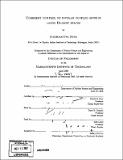Coherent control of dipolar coupled spins in large Hilbert spaces
Author(s)
Sinha, Suddhasattwa
DownloadFull printable version (12.89Mb)
Other Contributors
Massachusetts Institute of Technology. Dept. of Nuclear Science and Engineering.
Advisor
David G. Cory.
Terms of use
Metadata
Show full item recordAbstract
Controlling the dynamics of a dipolar-coupled spin system is critical to the development of solid-state spin-based quantum information processors. Such control remains challenging, as every spin is coupled to a large number of surrounding spins. In this thesis, we primarily focus on developing coherent control techniques for such large spin systems. We start by experimentally simulating spin squeezing using a liquid-state NMR quantum information processor. We demonstrate that the precision of quantum control obtained using strongly modulating pulses was sufficient to reproduce the theoretically expected behavior of the spin observables and the associated entanglement measures among the underlying qubits. We then investigate coherent control in a more complex solid-state spin system consisting of an ensemble of spin pairs. Using pulse amplitude modulation techniques, we decouple the weaker interactions between different pairs and extend the coherence lifetimes within the two-spin system. This is achieved without decoupling the stronger interaction between the two spins within a pair. We thus demonstrated that it is possible to restrict the evolution of a dipolar coupled spin network to a much smaller subspace of the system Hilbert space which allows us to significantly extend the phase coherence times for selected states. Finally, we demonstrate the sensitivity of highly correlated multiple-quantum states to the presence of rare spin defects in a solid-state spin system. (cont.) We design two multiple-pulse control sequences - one that suspends all spin interactions in the system including that of the defect spins, while the other selectively allows the defect spins to interact only with the abundant spins. By measuring the effective relaxation time of the rare spins, we demonstrate the efficiency of the two control sequences. Furthermore we observe that for small spin cluster sizes, the sensitivity of the highly correlated spin states to the spin defects depends on the coherence order of these correlated spin states. But beyond a certain cluster size, one observes a saturation effect as the higher coherence orders are no longer increasingly sensitive to the defect spin dynamics.
Description
Thesis (Ph. D.)--Massachusetts Institute of Technology, Dept. of Nuclear Science and Engineering, 2006. Includes bibliographical references (p. 101-106).
Date issued
2006Department
Massachusetts Institute of Technology. Department of Nuclear Science and EngineeringPublisher
Massachusetts Institute of Technology
Keywords
Nuclear Science and Engineering.